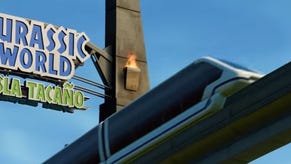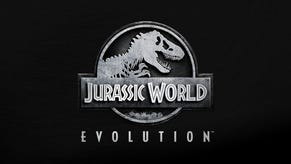Jurassic World Evolution Review
The kingdom hasn't fallen yet, but the world could be a bit bigger.
This article first appeared on USgamer, a partner publication of VG247. Some content, such as this article, has been migrated to VG247 for posterity after USgamer's closure - but it has not been edited or further vetted by the VG247 team.
I've played a number of bad Jurassic Park games, and Jurassic World Evolution is the most accurate gaming reflection of the Jurassic film franchise to date. It captures the wonder of creating a habitat for creatures long extinct, while also showing the player how a desire for more money will inevitably lead to someone getting eaten by a dinosaur.
Jurassic World Evolution is the work of Frontier Developments, the folks behind the excellent theme park builder Planet Coaster. It's a sidestep, taking what the studio learned from making that game and infusing it with a heaping helping of Jurassic World. The heyday of licensed games may have passed, but ideas like this one seem natural.
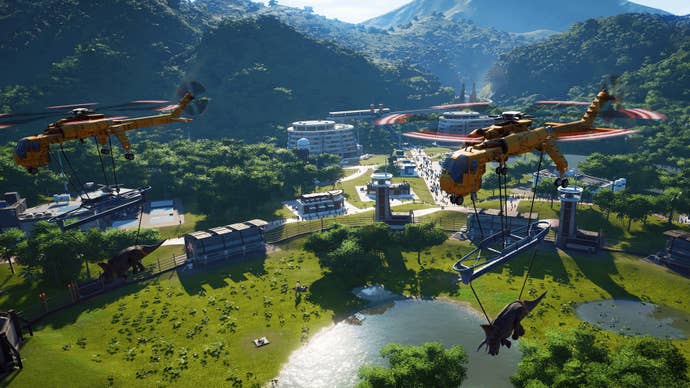
The core of the game is sound. You're set out on The Five Deaths, the island chain that forms the setting of every Jurassic Park/World film to date. It's up to you to mine fossils for DNA, create dinosaurs, and a build theme park that will be keep consumers entertained and alive. You have push back all the issues that can lead to catastrophic failure: dead people, dead dinosaurs, storms, and a general lack of public interest in your grand project.
My first park ended in disarray. It wasn't like the movies, where something went terribly wrong and many died, forcing me to end the entire endeavor; I just ended up running out of money. I had enough money to make a new dinosaur that would've drawn new patrons, but not enough to build another enclosure and dino-cloning facility. Part of this is because I didn't really know I needed a second dino-cloning facility. So, no cool new dinosaur, no patrons, no money, no park. A slow, slow death was coming, so I restarted.
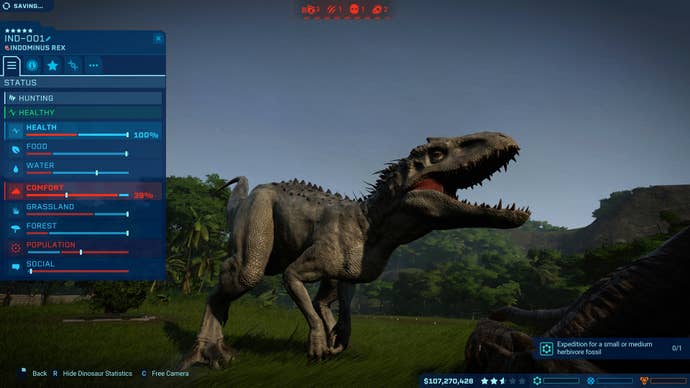
This is one of Jurassic World Evolution's problems: it doesn't adequately prepare the player for some new mechanics or the intersections between existing mechanics. To my example above, the problem was I wanted to introduce a carnivorous dinosaur into the park, but my cloning facility was attached to an enclosure with herbivores. The carnivore could be introduced to the enclosure, with meat feeders and goats to keep it from eating the other dinosaurs, but either by bug or design, the damn thing just went on a feeding frenzy with no care for its hunger.
So you need to either have a cloning facility for each enclosure, or the correct infrastructure to tranquilize and move a dinosaur immediately. You need the ACU team to remove dinosaur corpses as well, and both actions are fraught with their own peril, as they're are not always the crack shots you pay them to be. (It's better to take control and do it yourself.) Essentially, you have to spend a lot of your time in Jurassic World Evolution learning through trial-and-error. Be prepared to save, try out a thing, and then reload.
Jurassic World Evolution gives you free reign to determine how your park will play out within reason. You can place power, enclosures, facilities, and tourist traps where you think they'll play well with each other. In-between the physical management of the park, you'll play around in menus, managing various timers. You'll send teams on expeditions around the world for fossils, which you then extract DNA from. This DNA can be used to clone dinosaurs once you have a complete sequence, or edited to make new strains of dinos. You need to research improvements to park resources and complete contracts to gain money. Click a thing, wait for the result.
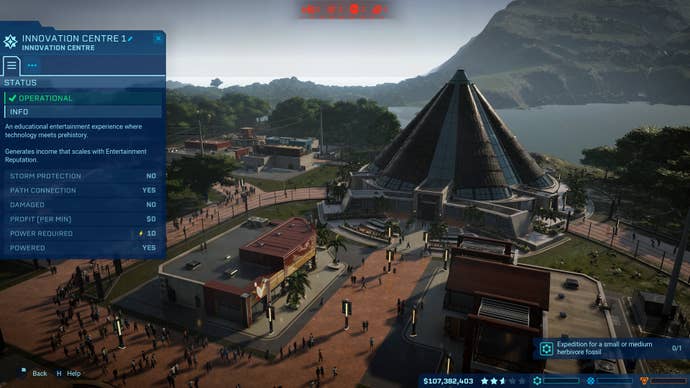
These contracts come from the three parts of your organization—Science, Security, and Entertainment—each of whom is vying for your attention. A contract will see one boosted in reputation, while the others will become dissatisfied, many times for no logical reason: you'd think Science and Entertainment would be happy to have a new dinosaur in the park, but since the contract came from Entertainment, Science and Security get salty about it. You need to manage this interplay, because certain infrastructure improvements are locked behind getting the respective loyalty meters high enough and letting any dip too low can lead to park sabotage from the unhappy group. The first Jurassic Park failed because of infighting, which I guess Evolution correctly illustrates.
This feeds into the game's second issue, which is the progression system. You begin on the first of the Five Deaths, Isla Matancetros, which offers a medium-sized building area. If you succeed in the early hours of the game and build a sustainable and profitable park, you're sent to the next island in line, Isla Muerta. Unfortunately, you start the new island with a meager starting wallet and the game throws new trials your way like flash storms and power outages. This stair-step of progression continues with the other islands; each has their own quirks, like starting you in backruptcy or forcing all operations to happen at night. Eventually, you'll unlock Isla Nublar, which is the biggest island, offering the player unlimited resources to build the Jurassic Park of their dreams. (With some nice franchise Easter Eggs too.)
The gap between Isla Matancetros and Isla Nublar is the core of the progression problem. Either end is quite fun, but in-between, it's managing storms, sabotage, corporate bickering, and loads of timers. It can feel more like busy work than enjoyment. This is true of many building simulators as they trend towards elder game, but Jurassic Park lacks the additional variety that can give those games life. Building-wise, you're always dropping the same restaurants and facilities wherever you go. Every enclosure is the same in terms of construction—make sure dinosaurs are healthy and patrons can see them—and there are no aviaries or enclosures for aquatic dinosaurs.
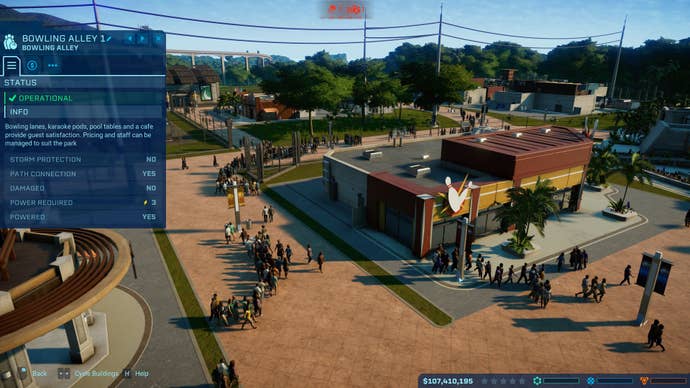
Frontier Developments' own Planet Coaster offered what felt like a ton of options to fill out your park in terms of design and I'm sad that more of that isn't apparent here. Instead, the feeling of new and different in Jurassic World Evolution comes from making new dinosaurs via the DNA system, not the buildings you're laying down. The game really wants you to play in this direction, pushing you towards fights with new genetic marvels, but it felt like a waste of resources to me.
There are moments when Jurassic World Evolution really kicks things up a notch and makes you feel like you're in Jurassic Park. Releasing a new dinosaur is always followed by a swell of music and a chase cam showing them in their new habitat. The dinosaur animations and audio are simply exceptional. The presentation really sells the idea of these being living creatures roaming around in the wild. You can even jump into one your of your jeeps or helicopters to take a first-person look at your park, which is keen.
Like any simulator, some of the best fun comes from saving and then purposefully letting everything go wrong. Let that Tyrannosaurus Rex go free, or a drop a herd of raptors into your best enclosure. Watching your best and most vicious dinos clear out the crowds of people is well-worth the experience. Surprisingly, you have to really go out of your way to get a full-on Jurassic World-style rampage of dinosaurs. Generally, the dinos lose steam after eating a few folks and park patrons have distressingly short memories.
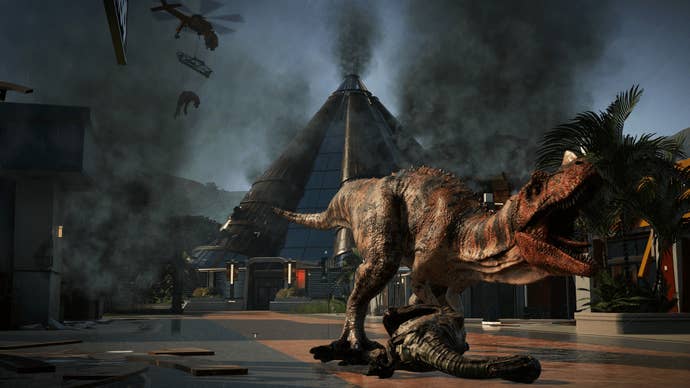
Ultimately, Jurassic World Evolution could just be better overall. I've had and still have some fun with it, but there needs to be more room for some real creativity and variety in terms of park composition. Despite leaning into its license quite well, Evolution is a downgrade from what Planet Coaster was, and I feel there's a better game somewhat between both titles. There wasn't enough gained over what was lost here. This is a basic foundation and Frontier can do better. Perhaps after a few expansion packs, Jurassic World Evolution will live up to its genetic potential.
ConclusionJurassic World Evolution really captures the feeling of the Jurassic Park/World film franchise: it's equally divided between the majesty of seeing well-animated dinosaurs roaming around and fending off corporate bickering. Unfortunately, the game lacks variety in terms of planning out your ideal Jurassic Park, especially in comparison to Frontier's own Planet Coaster. Evolution tries to lean on dinosaur DNA tampering to make up for that lack, but it's not quite enough. Jurassic World Evolution feels like a solid foundation, but there needs to be more DNA in this amber.


